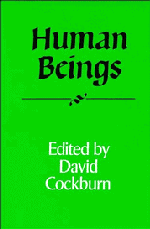Book contents
- Frontmatter
- Contents
- Introduction
- Machines as Persons?
- The Importance of Being Human
- Response to McNaughton
- Response to Diamond
- Real Selves: Persons as a Substantial Kind
- Personal Identity and Brain Transplants
- Personal Identity and the Idea of a Human Being
- Imagination and the Sense of Identity
- Radical Critique, Scepticism and Commonsense
- Getting the Subject back into the World: Heidegger's Version
- Incarnational Anthropology
- How Many Selves Make Me?
- Sartre and Our Identity as Individuals
- Bibliography
- Notes on Contributors
- Index
Imagination and the Sense of Identity
Published online by Cambridge University Press: 05 February 2015
- Frontmatter
- Contents
- Introduction
- Machines as Persons?
- The Importance of Being Human
- Response to McNaughton
- Response to Diamond
- Real Selves: Persons as a Substantial Kind
- Personal Identity and Brain Transplants
- Personal Identity and the Idea of a Human Being
- Imagination and the Sense of Identity
- Radical Critique, Scepticism and Commonsense
- Getting the Subject back into the World: Heidegger's Version
- Incarnational Anthropology
- How Many Selves Make Me?
- Sartre and Our Identity as Individuals
- Bibliography
- Notes on Contributors
- Index
Summary
Most of us, at one time or another, will have been struck by a thought that we might wish to express in the following words: ‘I could have been born in a different time and place, my position in life and all my personal characteristics could have been completely different from what they are; how amazing then that it should have fallen to my lot to live my life, the only life I shall ever live, as this particular individual rather than any other.’ This thought need not derive from a sense that there is anything unusual about one's life; what it expresses, rather, may be the sense that there is something gratuitous or contingent about one's being any particular individual at all. This sense of contingency might be connected with a feeling of gratitude, perhaps of responsibility towards others less fortunate in life; or it might be bound up with envy, or pride, or self-pity, etc.
Whatever the attitude taken, the thought seems to be intelligible only from a first person perspective. The idea that one might have this sense of amazement concerning some other person does not seem intelligible. I may be struck by the contingency of some particular aspect of another person's fate or personality (say, an ironic twist of events, a lucky conjunction of talent and circumstance), but his life as a whole, the fact of his being the person he is, is not a thing that could be contingent for me, in the way in which the whole of my own life may come to appear to me to be contingent.
- Type
- Chapter
- Information
- Human Beings , pp. 143 - 156Publisher: Cambridge University PressPrint publication year: 1991
- 2
- Cited by

